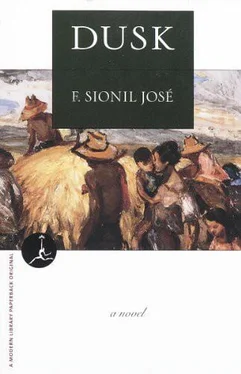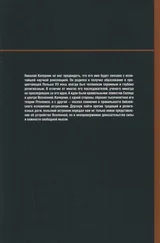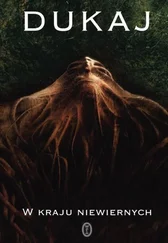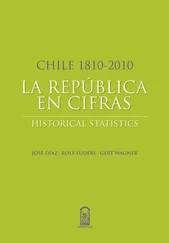“So we must seek new land beyond the mountains,” Ba-ac said to the hushed gathering. Above, the stars were out in all their splendor and the night around them was thick with the smell of earth, of sweat, of living. “We will go beyond the land of the Bagos; if need be, we can learn to live with them, start a new village, as others have already done — the many who also ran away. They cannot follow us there. They will not dare unless they come in droves and we will not be alone. Haven’t others done this?”
Ba-ac turned to Istak beside him. “Tell them, son. Tell them it is not hopeless.”
Istak turned to faces eager for solutions, for peace. He must tell them what he had always been told by Padre Jose — to have faith. As for patience and industry, they were Ilokanos born to these virtues — it was in their blood, in the very air they breathed.
“Since we have been ordered to leave anyway, we should not wait — we should look at this as a challenge. But in doing so, let us not forget the Almighty, that we go in peace although we be threatened, persecuted. This is the way of the Lord. I know some of you may want to stay …” From the older people, an immediate sound: one said, “No, we are all related, we will stay together.”
“How will we live with little grain? Will we eat the seed rice?” his uncle Kardo asked.
“We will live as we have always lived — frugally. We will eat bamboo shoots, the green leaves of the mango and butterfly trees. And the forest provides — we can trap deer, wild fowl. We have known difficult times — remember when we had so little food we ate the pith of the big palm?”
They murmured approval. They were Ilokanos — they would not starve anywhere. And they also believed Istak because he was the most learned, the most skilled in a language none of them could understand. Ever since his return, they had flocked around him, urging him to set up a school so that they, too, would know how to read and write — not just the rich mestizos and favorites of the friars. They would sustain him, weave his clothes, cut his hair, and give him enough grain to fill his granary so that he would not have to hold the handle of a plow and coarsen his palms. He had, of course, become enthusiastic about it, how much he could do — those years in Cabugaw were not to be wasted. He had already fashioned a series of lessons from the elementary cartilla to the higher form that would include philosophy and some science — he was going to impart to the young people of Po-on all that Padre Jose had given him.
He must tell them that there would be no school, and worse — that they really had to leave Po-on. This was all that the new priest wanted them to know. Now he would tell them that they had only the night to prepare, that sunrise must not catch them here. He remembered what Padre Jose had once told him of history, how the bearer of bad news was himself dispatched with the sword although the bad news that he brought was not of his own making.
To the right, across the level patch of ground, was the house of Kardo, his father’s youngest brother. Istak felt closest to him, perhaps because Kardo was more like an older brother. What mattered were his wife and his five children. He must leave, and not in peace but in fear. They had been welded together, not just by blood or marriage, but by work, for they had always shared what could not be done by just one man or one family — the planting of rice, the harvesting, the repair of the dikes, of the irrigation canals, and of their homes.
Before the clump of bamboo which formed an arbor, a gateway to the village, was the house of his mother’s sister, Simang. Her husband and children were before him, repeating, “Must we leave now?”
“But I will stay behind,” Istak said quietly. He had decided on this, to stay and to beg with them who ruled, that what Ba-ac did was on impulse. He would take whatever punishment they would mete out because it was for him that his father went to see the new priest. He spoke their language, he had proven his loyalty; they would understand. Yet he recoiled at the thought of what might happen; the Guardia did not care about justice; they knew only how to exact punishment.
Kardo told Istak there was no sense in being left behind, but Istak was adamant. If it was a guide they needed, Dalin knew the way.
He got an armful of firewood in the woodpile and tied it underneath the carriage of the cart. From below the houses, they gathered the chickens in bamboo coops. The pigs were trussed up. They did not have too many clothes — for each family just one wooden trunk and no more.
Tears in her eyes, Mayang dismantled the ancient loom under the house and carefully bundled the levers, the shuttles. The loom was her grandmother’s. Would there be cotton in the new land? They would build new homes and there was no time to uproot the posts, the sturdy sagat and parunapin which their fathers had dragged from the mountain. There were a few old posts, however, from the old house — as strong as ever — and these they tied underneath the carts.
They worked strenuously, loading what little food there was, even the green papayas in the yard. Daylight was nearing and stars glimmered in the bowl of sky; they would fade soon and the feared sunlight would be upon them.
Six carts — thirty people, including the children — that was all of Po-on. They would join the many others, the mal vivir who had fled the Ilokos whenever there was a revolt or a crime against the Spaniards.
An-no was finished with his chores and went to Istak. “Why don’t you want to come with us?”
Istak held his brother by the shoulder; An-no was taller and bigger of build. “This is what you want, is it not, my brother?”
An-no shook his arm off and his voice was no longer rimmed with bluster. “We need you, Manong,” he said. “No one among us can speak their tongue. This is a journey where wisdom is needed.”
“I have to stay,” Istak said simply. “I must speak to them, beg them.”
The dogs started to howl. Among the children roused from sleep and uncomfortable in the bull carts, one started to cry.
“This is one time we should stay together,” An-no said. “Can you not see that Father needs help? What have you really learned in Cabugaw?”
“What Does one need to know?” Istak asked, holding up his hands to show the raw blisters, but in the dark, An-no could not sec.
He could make out An-no’s angry face. “Stay behind, then,” his brother said, “and recite your Latin. Maybe the fruits of the trees will fall at your feet.” Then he wheeled and headed toward the line of carts being readied.
Alone, covered by the night which he sometimes wished was permanent, Istak cried softly. He was not going to be a martyr, he was not going to be heroic. It was they who were leaving who would be more than brave; the tulisanes preyed along the coast and the roads that led out of the Ilokos. If they went by sea, they would probably be safer, and if bad weather came, they could always head for some cove. But by sea, they could also be easily tracked and caught by the Spanish steamboats. If only Padre Jose were here to plead for him, for them.
In the house, Mayang had finished putting everything of value into the trunk. She had also gathered the woven bamboo crowns for the pots to sit on, the pine splinters for kindling wood, and lengths of rope. From a peg that stuck out of the bamboo wall, she took her most precious possession, a tortoiseshell comb inlaid with a thin veneer of gold. In the flicker of the oil lamp, Ba-ac recognized its gleam. “You are not wearing that,” he said.
“If I will die running,” Mayang said, “I might just as well die with this on my head.”
Their most precious possession, however, was not their good clothes or, for the women, their tortoiseshell combs. It was the carabao which they treasured most, because without this docile animal, they would not be able to farm; they would go hungry. Its skin had no pores and had to be cooled with a daily bath in the creek or with water from the well.
Читать дальше












